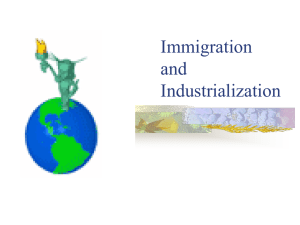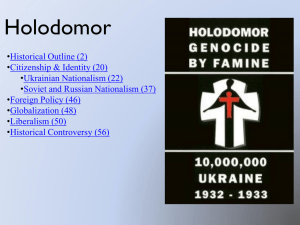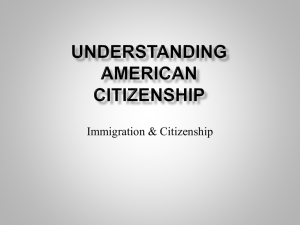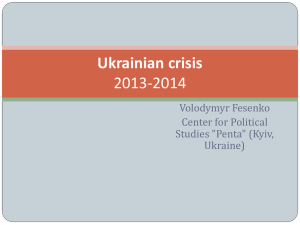File
advertisement
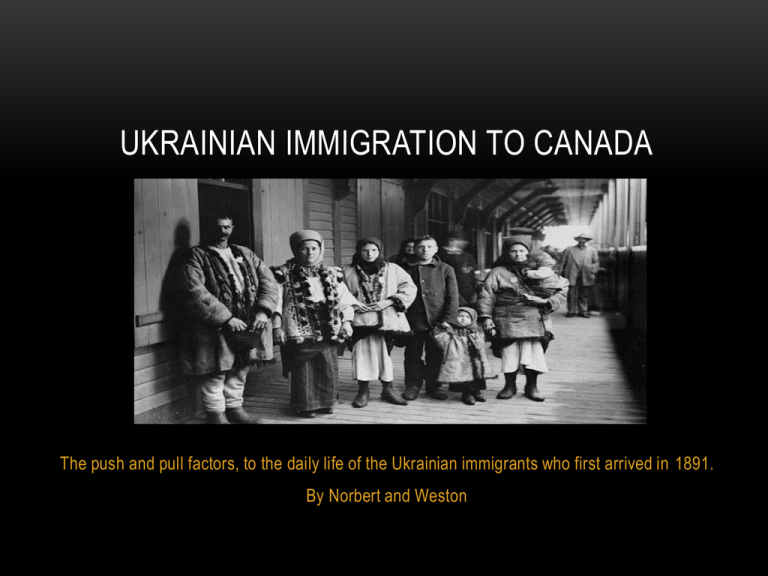
UKRAINIAN IMMIGRATION TO CANADA The push and pull factors, to the daily life of the Ukrainian immigrants who first arrived in 1891. By Norbert and Weston PUSH FACTORS • There are many valid reasons as to why the Ukrainian people decided to move away from their home land and moved to Canada and secure a better future for their families and children, they include: • ~ The lack of fair say for the Ukrainian people. At the time, Communist Russia had control of the eastern part of Ukraine, who forbade the people having a say in the government, this caused many Ukrainians to immigrate to Canada for the much more fair democratic government we have. • ~ Because communism dictates that all people share in common the amount of money they earn, regardless of their job, the Ukrainian people had very, very little room for self advancement, this caused them to seek a new, more friendly future in Canada, so that they could become more successful than they ever could back in their homeland of Ukraine. • ~ Education was poor in Ukraine, parents wished to give their children more opportunity for advancement in the future by moving to Canada, where education was believed to be better than their own. • ~ Farmers had very small plots of land to farm off of, and could hardly support their families with the tiny amount of fruits and vegetables they could harvest, Canada is large, and the government was practically giving away land to immigrants, this was a very alluring to the Ukrainian farmers. PULL FACTORS • Between 1891 and 1921 Canada’s population almost doubled. Many people from all around the world came to Canada and between this people was the Ukrainian immigrants. Seventeen thousand Ukrainians came to Canada by 1891 and they had arrived near and in Edmonton, so most of them in Alberta. The Ukrainian immigrants settled in the West of Canada. • There are a couple of pull factors about why they choose Canada, why they decided to came and live here. To figure out this pull factors and to be able to explain them we need to have done some researches : • Canada was and is a fast developing country and the Ukrainian immigrants hoped they will live a better life here in Canada. They had the lure of opportunity in another country, like Canada, who is in a great development. • Ukrainian immigrants looked to Canada as a place where they could improve their quality of life. They had dreams and they believed Canada will help them to their dreams become reality. • Ukrainian people was a poor Eastern European nation, always they was influenced by the Russian communism, the communist party and when the Russian Revolution was started some Ukrainians decided to fight against the communist party, but some people decided to leave their home and search a better one, search the new home, when they can live a better life without communism and other bad things in politic factors. This people was the Ukrainian immigrants ,who came to Canada • Also the Ukrainian farmers dream was to came in Canada, because here they have free farmland. In Ukraine they got no land and they can not continue their life with farming. In Europe nowhere was enough farming land , just in Russia, but there was and is so cold in Russia, so the Ukrainian immigrants decided to leave their country and continue their daily life with farming in Canada. • Besides The Ukrainian people was clever people and they figured out in which part of Canada the can go. If they want to life just with farming or rising grain prices they choose the Canadian Prairies, if the want to have jobs in Industry Factories , they came in East of Canada and if they want to work in resource industries like fishing, lumbering or mining, they came in the very west of Canada, example in British Columbia IMMIGRATION POLICIES • In 1906 was written the Immigration Act to prevent the other group of people the government feared would place a strain on the federal government. On top of pre-existing rules meant to keep the insane or criminally minded out of Canada, this act was expanded to include former inmates of mental hospitals or jails, or anyone who'd been charged but not convicted of serious crimes. • Immigration laws were also strengthened in 1906 and 1910 to allow the government to deport unwanted immigrants, like those suffering from severe illness. A probation period of three years was additionally set in place for every immigrant coming to Canada in 1910. If immigrants committed crimes in Canada within that three-year period, they risked being sent back to their home countries. • Around the same time, Canada experienced a mild economic recession. A measure was introduced in which all immigrants to Canada would have to possess at least $25 upon landing as a way of proving to government officials that they weren't destitute. Also between 1902 and 1913, the Canadian government deported almost 870 people on the grounds that they were insane. • Rules involving quarantine of passengers were introduced in a separate quarantine act in 1872. There were few other restrictions on those who could come to Canada initially, but anyone who was blind, deaf, insane or infirm were to be now have to be recorded by the ship captain on the passenger lists. If a person was likely to become a threat to public safety, the customs officer in Canada was to collect a $300 bond. • Additionally, if destitute or poor immigrants were coming to Canada, the ship captain transporting them had to pay a sum of money equivalent to their travel and initial living expenses within Canada. Businesses seeking to solicit services to immigrants had to obtain a special license from the government under the Immigration Act. This was to prevent fraudulent innkeepers and boarding house managers from taking advantage of new arrivals. SOCIAL STATUS • Surprisingly, despite being Caucasian, and from Europe, Ukrainian peoples who travelled from their home land to Canada for a better life actually were loathed by some Canadians, and in later cases, were even put in internment camps. Because many of the Ukrainians that came to Canada came to Canada because of the better opportunities for making money, they were usually poor. This impacted the Canadian views of the Ukrainian people, resulting in stereotyping and generalization, with some calling these people “the dirty, penniless scum of Europe.” To add onto the problem of most of them being poor, many of the Ukrainians did not know how to read or speak English, and they often continued to wear traditional clothes even after landing in Canada, something which many Canadians did not appreciate. Along with this, the religious views of Christianity, including the worship of the Byzantine rite, did not sit well with other beliefs that were more prominent in Canada before the arrival of Ukrainian immigrants. Thankfully, over time, the Ukrainians slowly became more recognized as hard working, dedicated farmers, and much of the hostility towards them was lifted. DAILY LIFE • Ukrainians daily life looks like this : (woman’s format) • 4:30 a.m. Rise, go to the barn and milk the cows • 5:30 a.m. Start preparing breakfast. Cook 150 pancakes, fry 10 dozen eggs, and kg of bacon. Make enough coffee to fill a washtub. Serve all this food at long tables set up in the kitchen. • 7:00 a.m. Wash all the breakfast dishes. • 8:00 a.m. Bake 40 loaves to bread. Start preparing the mid-day meal. Peel and boil 60 potatoes. Scrape piles of carrots and mash turnips. Roast several slabs of beef. Bake rice puddings well-filled with raisins. Make a batch of 6 dozen dough-nuts. Brew more coffee or strong tea. • 12:oo noon Serve the meal to the hungry gang. • 1:00 p.m. Clean up the house, tend to the children, and prepare for supper. Wash the lunch dishes. Bake 2 dozen apple or pumpkin pies and a batch of cookies. Prepare vegetables and fry 70 pork chops. • 5:oo p.m. Return to the barn for evening milking. • 6:30 p.m. Serve supper to the wary threshers. • 7:30 p.m. After everyone leaves, remain in the kitchen cleaning up and preparing food for the next day. Slice 4 kg of bacon for breakfast. Fill containers with syrup. Tuck the children into bed. • 11:00 p.m. Fall exhausted into bed. CONTRIBUTIONS • The Ukrainian peoples who escaped the dire situation they were in in Ukraine were mostly farmers, so naturally they became farmers when they arrived in Canada. It was only after establishing make shift homes, and producing their first crops, which could take a couple years, that the new Ukrainian immigrants could start to sell their crops for money. Without the influx of Ukrainians to Canada, much of the west would not have been settled, hindering John A MacDonald's plan to settle western Canada in order to keep the United States from seizing the valuable land for themselves. Not all Ukrainians were farmers though, some worked by mining, while others logged, clearing forests and making more room for other potential immigrants, or other western settlers. BIBLIOGRAPHY & SOURCES • "Canada in the Making - Specific Events & Topics." Front | Canadiana. http://www.canadiana.ca/citm/specifique/immigration_e.html (accessed May 1, 2012). • Cruxton, J. Bradley, and W. Douglas Wilson. Flashback Canada. 3rd ed. Toronto: Oxford University Press, 1994. • Murray, Cam, and Graham Jarvis. Horizons: Canada moves West.. Toronto: Prentice Hall Canada, 2000. • Subtelny, Orest. "Ukraine: A History - Orest Subtelny - Google Books." Google Books. N.p., n.d. Web. 1 May 2012. <http://books.google.ca/books?id=HNIs9O3EmtQC&pg=PA547&dq=Discrimination+Canada+Ukrainian&sig= W0jvvKrVpEiSjpKS_D5jztNNK4&redir_esc=y#v=onepage&q=Discrimination%20Canada%20Ukrainian&f=false>. • Images: • http://www.cic.gc.ca/english/resources/publications/legacy/images/ph-210ht.jpg • http://www.ukrainian-dreams.com/images/PA-010401.jpg



